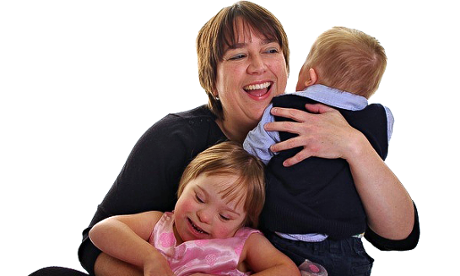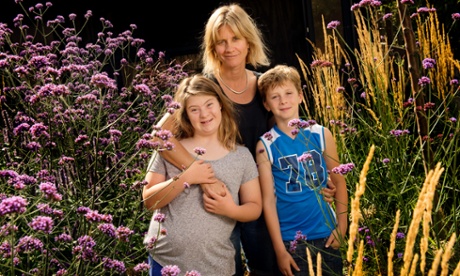Six days after our first baby was born, it was confirmed that he had Down’s syndrome. The news was devastating: I assumed a lifetime of “difference” and exclusion, all my aspirations for my child seemingly in tatters. I had never known anyone with Down’s syndrome, so I threw myself into researching the condition. Everything I read listed possible problems, physical differences and challenges we could face, and I felt overwhelmed and weighed down by his diagnosis.
The reality could not be further from that bleak vision. Bit by bit, the hurt began to lift as I fell in love with my baby. Eventually I stopped seeing Down’s syndrome and realised that Seb was simply my son.
While a diagnosis is essential in explaining certain characteristics and behaviours, as well as ensuring access to support, early intervention and best teaching practice, it can also label a child with out-of-date assumptions and often misses the colour and dimension of reality.
So, here are 10 things a diagnosis of Down’s syndrome didn’t tell me about my son, who is now eight:
1. He is an individual. There is a very common misconception that all people with Down’s syndrome are the same. This may have been true at a time when babies with Down’s syndrome were sent away to institutions, were dressed the same, given the same haircuts, and were not nurtured or allowed hobbies and interests or enabled to reach their fullest potential.
Thankfully, today, babies with Down’s syndrome are brought up in their own families, educated and included in their communities and lead lives very typical of any child. Seb is bright and witty and mad about football. He is a reflection of his upbringing and life experiences.
2. He would have a high emotional intelligence. One thing that seems to be common in people with Down’s syndrome is a high level of emotional intelligence and incredible empathy. Seb is highly attuned to the needs and feelings of others, something that was evident from a very early age. When he was a toddler, if he heard another child cry, he would cry too. I have seen the most tender moments between Seb and his siblings if either of them has been upset – and if his younger sister, who is five years his junior, is getting a telling off, he often stands up for her as a mark of solidarity, support and loyalty. He also has the incredible skill of engaging with people of all ages.
3. He would be the boy I always imagined I was having. I found out we were having a boy when I was 20 weeks pregnant. For some reason, I had assumed we were having a girl but, after a flicker of surprise, I began to picture what our lives would be like.
I imagined a tall, handsome, sporty boy, popular and an all-round good kid, hanging out in our kitchen with his mates, helping himself to food from the fridge, chatting about his day at school before heading off to a game of football or a concert.
It seems ridiculous now, but when a doctor delivered those two words, Down’s syndrome, all the aspirations I had once held for my son, and our family life, were shattered. Suddenly, I faced a future of unknowns.
Eight years later and I look back and laugh at the ridiculousness of it all. Seb is one of the sportiest kids I know, his teacher says he is one of the most popular children in his class, if not his school. He is bright and witty and I couldn’t be more proud of him.
4. He would see the value in everyone and everything. Seb is so interested and in tune with the world around him. He tends to live in the moment and sees the value of every interaction. A typical walk to school involves stroking dogs, saying hello to strangers, picking flowers, balancing on walls and cooing over babies. I love how he doesn’t dwell on the past or fret about the future.
Earlier this year, we were strolling along a marina in Portugal and a family passed us – a mother, father and daughter. The girl was profoundly disabled, in a wheelchair. Stopping in his tracks, Seb went over, picked up her hands and stared into her eyes.
“Hello,” he said gently. “What’s your name?”
“Her name is Agatha,” said the dad.
“Agatha,” Seb repeated. “Hi, I’m Seb. How old are you?”
“She is 29,” the dad answered, “but she is more like a little girl. She is our girl. She cannot talk, she can only talk with her eyes,” he added.
And at that moment, the girl’s eyes flickered and set on Seb’s smiling face.
The chat carried on a little longer before we said our goodbyes and I walked off with a lump in my throat. Scores of people in that marina that night just walked past this woman, every one of us assuming she had nothing to offer, no value, but Seb saw so much more.
5. We would become part of an incredible network of support. Over the years, and thanks to the power of social media, I have made some deep friendships with people who just “get it” and know what to say, friends I can be brutally honest with, who won’t judge me.
The Down’s syndrome community is a wonderfully diverse mix of people from all walks of life. It makes for an incredibly strong and powerful group, with a rich diversity and pool of knowledge and talents. We have also experienced the support of family, friends, neighbours, carers and professionals, who all champion our cause and really, genuinely care about Seb.
6. He will reach his goals. Seb is very driven and strives for success. I see him tirelessly practising his football skills in the garden and taking time and care to improve his handwriting or learn his spellings, and I know that this drive to succeed will mean he will reach whatever goals he sets himself. I fully expect Seb to grow up and get a job, live an independent life, maybe with support, meet a partner and settle down. He may need a little extra help at times, but there is no reason why he won’t achieve his goals in life. Above all, my hopes and aspirations for Seb are just the same as they are for his siblings – that he grows up to be a nice person and is happy in life.
7. We would lead a typical family life. School, homework, tag rugby, football, choir, swimming lessons, cinema, birthday parties, eating out. That probably sums up a fairly average week in this house. As a family, we share the same ups and downs, celebrate the same achievements and experience the same frustrations as any other family.
8. He would shape all of us for the better. Seb has taught me so much and undoubtedly shaped me into a better, more tolerant person. Where once I might have judged someone or made a snap decision on my viewpoint, I now think things through a lot more. I appreciate that none of us chooses where, how, or who we are born and, as a result, I see the world from a different angle. I am a much more open person than I was before.
People also often assume that having a child with special needs puts pressure on their siblings and it is something I have worried about in the past. There have been times when I have worried that Seb’s younger siblings are missing out, or feel he gets more than the lion’s share of attention, but my middle child, who is six, already shows how Seb has shaped him for the better. When he was just three, his preschool teachers told us that he had very high empathy levels for his age, and a caring nature: he would always be the first to console an upset child, he is very good at sharing and is very thoughtful. He also understands that we are all different. He once asked me why Seb “talked funny” and I explained that we are all unique and have different strengths and things we have to work hard on. He immediately piped up: “Oh, yes, like Seb is good at football.”
9. Inclusion is the answer to everything. I know that my initial fear of Down’s syndrome existed because I had never known anyone with it, or had the chance to see beyond the label. I see the importance and value of inclusion on a daily basis at school and in our community. Nothing fills me with more happiness than when Seb enters the playground and is welcomed into a game of football. I also know that if you asked a friend of Seb’s to describe him they would say he was sporty, or funny, or wore glasses, or supports Chelsea. If you asked a parent, they would probably say he was “the Down’s syndrome kid in year 3”. We have so much to learn and gain from inclusion, and I truly believe it will breed a new generation of acceptance.
10. Despite some challenges, I wouldn’t change a thing. Having a child with special needs does bring challenges. Seb needs extra support to achieve the things that come naturally to others, we often have to fight for funding and can sometimes be faced with prejudice. I physically hurt at his potential vulnerability and dare not think about what might happen when I am no longer here, but that is because of societal ignorance, not Down’s syndrome. Seb has enriched my life beyond measure and I feel truly blessed that he is my son.
• Caroline White’s The Label: A Story for Families is published by Ivy Press, £6.99, in January 2017 (10% of proceeds from the sale will go to Mencap). To order a copy for £5.73, go to bookshop.theguardian.com or call the Guardian Bookshop on 0330 333 6846.










